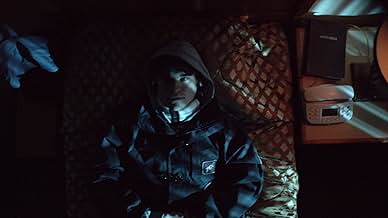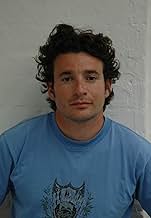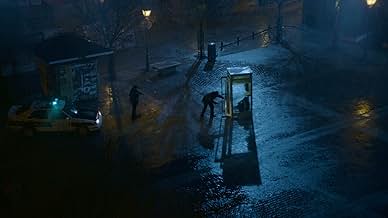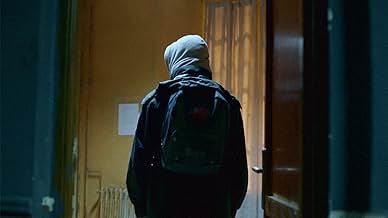Documental que se centra en un joven en España que asegura a una familia de Texas en duelo que él es su hijo de 16 años, desaparecido durante tres años.Documental que se centra en un joven en España que asegura a una familia de Texas en duelo que él es su hijo de 16 años, desaparecido durante tres años.Documental que se centra en un joven en España que asegura a una familia de Texas en duelo que él es su hijo de 16 años, desaparecido durante tres años.
- Ganó 1 premio BAFTA
- 13 premios ganados y 34 nominaciones en total
- Self - Missing Person
- (material de archivo)
- Self - Imposter
- (as Frederic Bourdin)
- Self - Special Agent, FBI
- (as Nancy B. Fisher)
- Self - Consul General, U. S. Embassy in Spain
- (as Phillip French)
- Self - Texas Children's Hospital
- (as Bruce D. Perry)
- Self - Nicholas' Neighbor
- (as Allie Hosteiler)
- Judge
- (as Maria Jesus Hoyos)
Opiniones destacadas
Back in 1994, the blue-collar Barclay family from San Antonio, Texas, was left distraught after the disappearance of their 13-year-old son, Nicholas. Like any teenage boy, Nicholas was a cocksure kid, filled with energy, love for his family, and certainly wouldn't runaway from home for no good reason. Weeks turned into months, and eventually the case was abandoned by the police and press. Three years later, the local Texas police department receives an international call from Spain. On the receiving end is a character claiming to be Nicholas. Putting in a bogus story about how he escaped the clutches of a drug fuelled, pedophilic organization, the police think his story check out, and soon enough Nicholas' sister Carey jets over to Europe to meet her long lost brother. In front of police officials, she takes a good look and identifies him as the legitimate lost brother. Three years ago, Nicholas was a blue-eyed, spunky American teenager, now he's transformed into a dark haired, brown-eyed man with stubble and an irreplaceable French accent.
The Imposter, like it's central subject, is not the documentary you expect it to be. With many twists, contortions and moral judgements, your pretty much open-mouth and on the edge of your seat throughout the film's entirety. That's partly down to Layton's craft, particularly the Errol Morris-like interviewing technique – which sees people gaze directly into the lens of the camera and, vicariously, straight at us. But, even more astounding, is the capricious performer that names the film. Frédéric Bourdin, a then 23-year-old man of French-Algerian descent, is actively impersonating Nicholas the whole time, convincing not only the state officials, but the abandoned boy's own mother. With a shrouded history as a homeless orphan thrown into the life of deception and petty crime, he longed to fit in and have a family of his own. When that opportunity didn't surface, he decided to steal Nicholas's own.
"How could he get away with it?" I hear you cry. That's something I'll leave for you to answer when you see this documentary. Suffice to say, Bourdin is an intimidatingly convincing, intelligent and charismatic figure. To the point where we sit back and reflect whether we could have been swung by his quick wit. Even if Bourdin is the great pretender, a new revelation in the film's final act suggests that the Barclay family are perhaps keeping up appearances of their own.
It may not be my favourite documentary of the year (The Act of Killing, if you were wondering), but The Imposter is the best psychological thriller I've seen in recent memory. It transcends the documentary stratum. A dauntingly universal account of a missing child and false identity, it's stupefying moments will leave you silenced whilst the movie plays out. But, as soon as the credits roll, you'll be talking about this exceptional movie for years to come.
Read more reviews at: http://www.366movies.com
The perpetrator, one Frederic Bourdin, randomly picked his new identity from a file of international missing persons whilst in police custody, although you would think he could have done a better job of it as he was at the time six years older than the boy Nicholas Barclay he chose to impersonate, had a different hair colour and spoke with a pronounced accent, never mind being separated by the Atlantic Ocean, but preying on a family elated at the prospect of the miraculous reappearance of their long lost son, he ran the whole nine yards in the role before finally a doctor's testimony put a stop to the charade and eventually saw Bourdin go to jail, leaving behind a family now heartbroken a second time and a host of incredulous officials duped by his brazen callowness.
Like a dark version of the Emperor's New Clothes, this is a story of a desperate family seeing what wasn't there and believing the impossible through the blinding distortion of their individual and collective grief. It all really starts with the boy's sister who flies to Spain and immediately falls for her long-lost brother's incredible return from the dead, swallowing whole his explanations for his changes of appearance, voice and character. Bourdin, now spying a life of ease in America as the pampered born-again son, had decided to follow through with the ruse, dying his hair blond, adding a few tattoos and concocting a fantastical story of being kidnapped and transported abroad to a life as a sex-slave with the so-called gang even managing to conveniently change his eye-colour in the process.
There's no question of the film-maker here attempting some is-he-or-isn't-he mystery, as the film's title makes clear, confirmed by Bourdin's first smirking, unrepentant appearance. The key events in the fraud are recreated dramatically and interspersed with interviews of all the major players in this unbelievable story set to a deliberately light, capering musical soundtrack which itself from the first strongly hints at the elusiveness and illusion at the heart of this incredible story.
In the end Bourdin got jailed for six years, the missing boy's hapless family saw their hopes of his resurrection brutally dashed and of course, his abduction and likely murder returned to the files of the unexplained and unsolved.
I came away from the film with a sense of how the power of loss, especially that of a child, can so blind a family which had given up hope and a sense of rage at the heartless selfishness of a still apparently unapologetic sick individual who even today diverts blame back to the trusting family who took him in.
Pity help the wife and three children the film tells us in an epilogue he lives with today.
As a story it is hard to believe and on this level it is engaging because it is so fantastical that you cannot stop following it but it still needs to be delivered well – just because you have a good story doesn't make you a good story-teller. In this case though the film does a great job from start to finish. Interviews, reconstructions and archive footage are all used very well to slowly build the story and follow it to the conclusion. It is filmed in a very cinematic way, with effects of thrillers and a sinister air to it that I thought might be a bit forced but actually worked very well indeed – the cinematography of the reconstructions and the clever editing of the interviews into the film really worked to the film's benefit. The contributors are mostly engaging and quite open – in particular "The Imposter" himself is a real presence in the film, we may not really understand him (or any of them really) but his contributions really helps us get inside the story.
That the Imposter is a great story is one thing, but this film tells it very well indeed. It has weaknesses when it comes to understanding the characters but the thriller-approach works and drives the story forward in a manner that is satisfying and engaging. Excellent documentary.
¿Sabías que…?
- TriviaThe family of Nicholas Barclay initially declined to participate in the documentary, as they felt they had been unfairly portrayed in the media in the past, and they had lost much of their home video footage of Nicholas in a fire. They eventually consented to be interviewed, and the small amount of footage that has survived was used.
- ErroresAt the beginning of the film, Frédéric Bourdin's hair line is very defined and has dark hair. But by the end of the film he has a noticeable receding hairline. However, the film portrays his talking scenes as one long interview as his shirt never changes.
- Citas
Frédéric Bourdin - Imposter: Before I was born, I definitely had the wrong identity. I already didn't know - I was already prepared not to know who I really was. A new identity with a real passport, an American passport... I could go to the U.S., go to school there, live with that family, and just being someone and don't have never again to worry about being identified. I saw the opportunity.
- ConexionesFeatured in WatchMojo: Top 10 Most Hard to Watch Documentaries (2018)
Selecciones populares
- How long is The Imposter?Con tecnología de Alexa
Detalles
- Fecha de lanzamiento
- Países de origen
- Sitios oficiales
- Idiomas
- También se conoce como
- The Imposter
- Locaciones de filmación
- Productoras
- Ver más créditos de la compañía en IMDbPro
Taquilla
- Total en EE. UU. y Canadá
- USD 898,317
- Fin de semana de estreno en EE. UU. y Canadá
- USD 22,379
- 15 jul 2012
- Total a nivel mundial
- USD 3,001,877
- Tiempo de ejecución1 hora 39 minutos
- Color
- Mezcla de sonido
- Relación de aspecto
- 2.35 : 1
Contribuir a esta página








































